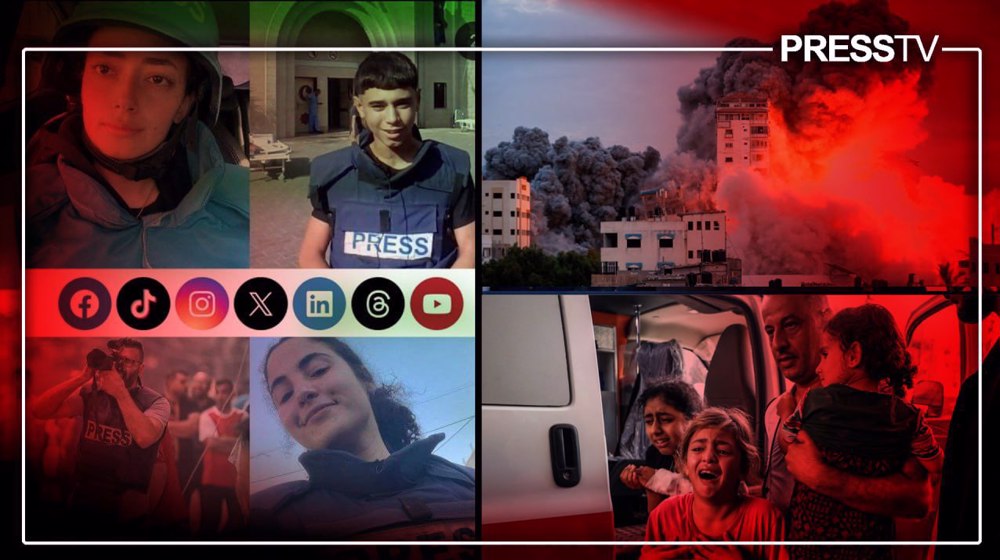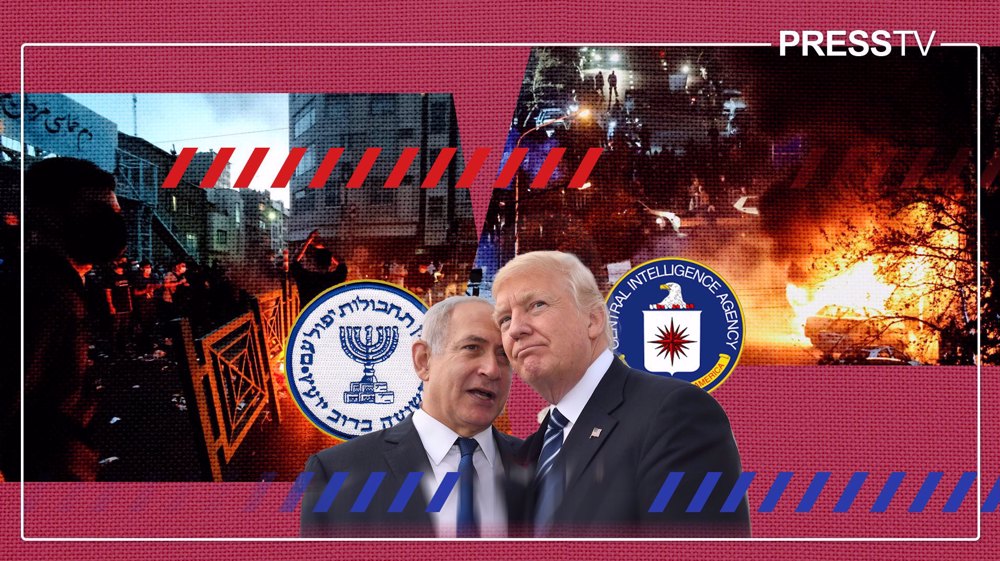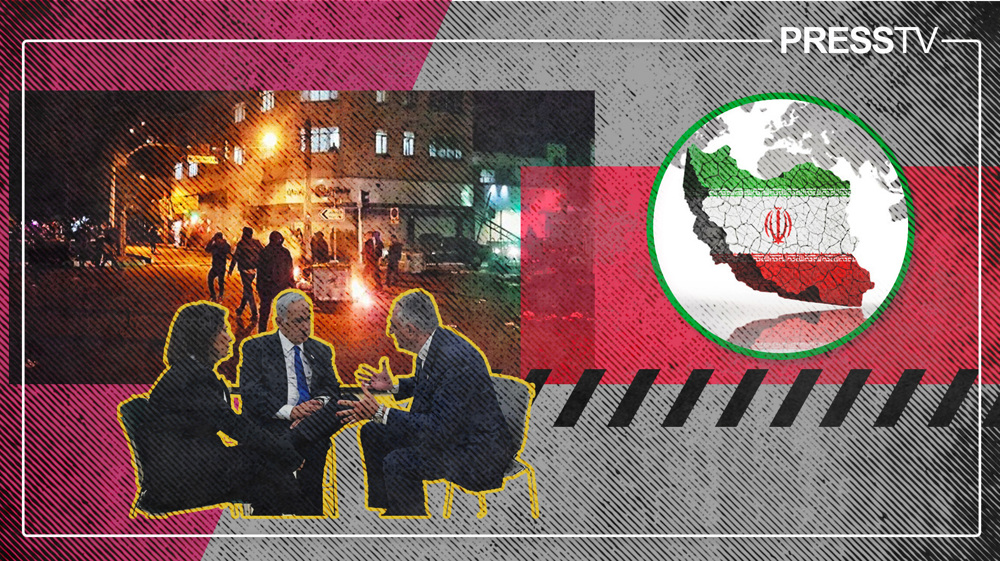Inside Gaza: How Palestinian citizen journalists are chronicling life amid war
By Maryam Qarehgozlou
“We are afraid of night. At night, we die without anyone hearing or seeing us. We get injured and bleed to death without anyone helping us,” Bisan Owda, a Palestinian content creator writes on Instagram, sharing her harrowing experiences amid Israel’s war on Gaza.
“The occupation takes advantage of the night to burn the entire residential blocks without mercy, by bombing it with warplanes, without allowing anyone to enter or leave the area,” she writes in a thread captioned: “things you will never know about Gaza from the media.”
Bisan, a 25-year-old filmmaker, who also works for the United Nations Population Fund (UNFPA), has been narrating and documenting the life of Gazans since October 7, when the Israeli regime launched its no-holds-barred genocidal campaign against the territory.
“Hi guys, I’m still alive,” is how she usually begins her short reels on Instagram every day.
Bisan was among the 1.1 civilians living in northern Gaza who were forced by the Israeli regime to evacuate to the south in the first week of the war.
In one of the videos, while reporting on the forced evacuations, she narrated how Israel had tricked them into evacuating their homes by claiming to provide them a “safe route” while bombing the roads and highways, killing hundreds of people, mostly children and women.
“They targeted ambulances, buses and cars on the roads and more than 150 people were killed until now …, they are playing with us, innocent people took everything from their homes to go south and they [Israel] killed them, … and I cannot even imagine I am living this, that this is real, I am losing my mind,” Bisan said, choking with emotions.
At first, Bisan and her parents were sleeping alongside thousands of other displaced people in and around the al-Shifa Hospital, the largest hospital in Gaza that was earlier this week stormed by the marauding regime forces, putting tens of thousands of lives at risk.
Bisan’s family had to move to Rafah and from there to Khun Yunis, a flashpoint city in southern Gaza, to flee Israel’s non-stop bombardments.
“Moving when four words are said in a row sounds very easy, but when you think about how much you have to carry, how much you have to sleep in unfamiliar places… how to find a bathroom, an emergency exit, internet connection, charger, electricity, you realize that it’s not just four words, … we have to adapt a new life every time,” she said.
No food to eat, no water to drink
Amid the perennial struggle for survival, she also shares with her 2 million followers how they are rationing the little food and dwindling water stocks as Israel has cut off supplies of food, medicine, water and electricity to punish the local population and force them to flee.
“Even if we survive the bombings, … there is no clean food, there is no clean water, all water we have is the salty water from the sea,” she said in one of her posts on Instagram on November 5, struggling to hold back tears.
Bisan said the Israeli regime is trying to “kill people by hunger” and making them sick with contaminated water, as Gazan families can no longer afford even one meal a day.
“There is zero aid entering the north for a million people who are still staying in the area.”
In a video she shared on Sunday, the Gazan activist rebuked Israeli media for “re-defining civilians” saying the Israeli soldiers are targeting those who chose not to obey the evacuation orders and stayed in the north with snipers and kill whoever tried to step out of the hospitals.
“No one can go outside the hospitals or the homes surrounding the hospitals because anyone who goes outside will be targeted by a sniper or by the Israeli soldiers,” she noted.
“The Israeli media and army are telling us that there are no civilians in the north, that the north is 100 percent empty and that they are dealing with terrorists. At the same time every single minute we are publishing calls from people stuck in their homes in the north for 5 or 6 days and we have to provide them with food, water, and safety.”
Despite the unlivable conditions and back-breaking ordeal, she tries to remain upbeat.
“I will continue doing what I do as much as I can until this situation changes and I can tell you how the country is rebuilt and becomes beautiful again,” she said with a sparkle in her eyes.
Bisan is only one of the content creators in the besieged territory, trapped with their families, who are with cellphones capturing and narrating in real-time the war unfolding in Gaza.
These Palestinian citizen journalists, most of them acquainted with English, are now covering the war they are living in raw and intimate posts, reporting what mainstream Western media has been reluctant to show in an attempt to whitewash the Israeli war crimes.
Capturing the genocide unfolding at home
“I’m a photographer who wanted to capture the beauty my eyes see, not the genocide that is happening to my people,” 24-year-old Motaz Azaiza wrote on his Instagram account.
Motaz, who holds a bachelor’s degree in English translation from a Gaza university, has been photographing and filming traumatic scenes in the aftermath of October 7 and has turned into a popular and widely followed war correspondent on social media.
He has more than 14 million followers on Instagram now, as well as many fan pages.
Every day, the young chronicler risks his life to document life amid the war, usually filming in selfie-style, to show the world the ugly and raw reality of living under the Israeli bombs and to counter and debunk the false narratives being peddled by the mainstream media.
Motaz’s videos and photos include graphic images showing toddlers in agony after being rescued from beneath the rubble of their destroyed buildings, people trying to rescue those trapped under the rubble, and people sobbing over the lifeless bodies of their loved ones.
On Tuesday, he shared the footage of an Israeli air strike in a neighborhood close to his grandparents’ home where he stopped by to bring them some food and water.
“I parked the car in the street and ran to catch the first footage even before the dust of Israeli air strike got away,” the footage caption read.
He also spends time with orphaned children, feeds people, and quenches their thirst. He has carried dead children in his arms and lost colleagues and families in the bombardment.
On October 12, he posted a video of the aftermath of an Israeli bombardment that killed at least 15 members of his family members, most of them women and children.
“Staying alive is more stressful than dying! At least when you die you will not feel a thing. We never had a choice, and the day we try to choose is about choosing to stay and die or to leave and lose your dignity and everything you worked to build,” he wrote in a post on November 11.
Life amid the war, bombs, death
Plestia Al Aqad, 22, is another young Palestinian journalist who has been using her social media to share the scale of death and destruction in Gaza, to counter the disinformation.
She has a degree in communication and media studies, new media, and journalism from Eastern Mediterranean University. Before the war, she worked as a trainer at a media club.
Plestia, like many others, has also been risking her life to chronicle the experiences of her brethren in the besieged territory amid the Israeli bombings of schools, hospitals, and homes.
She regularly visits displaced people seeking refuge in UN schools and hospitals and shares heartwarming moments with innocent children who know nothing about the war.
“I love how innocent kids are, and how they don’t understand what is going on, they just listen to the sounds of the bombs not knowing what is happening,” she wrote in a post on Instagram, sharing light moments of hugging a group of kids who had gathered around her.
There is a remarkable difference between her recent posts portraying the harsh reality of war in Gaza amid the war and the previous content she used to share about her daily life.
“Life was never normal in Gaza, but I miss what I thought was ‘normal’ life,” she wrote in a post.
Bisan, Motaz and Plestia are only some of the Palestinian citizen journalists who are these days showing how Gazans are struggling with life and encountering death on a daily basis.
However, recurrent loss in connectivity due to Israeli airstrikes, cuts in electricity, and episodes of near-total internet blackouts are major hurdles for those who are working hard to convey the truth of what is happening in Gaza, beyond what’s being reported in mainstream media.
Gagging the voices of truth
Moreover, those who are posting Palestinian content are also facing shadow bans or other types of restrictions on social media platforms.
Despite denials, Meta, Instagram’s parent company, has been busy blocking pro-Palestine content without notifying the users. It has reportedly been restricting content that depicts Israel’s actions in the Gaza Strip as part of the Western media’s pro-Israel bias.
“I re-uploaded the video, @meta what’s wrong Habiby (an Arabic word that literally means “my love”), this is the truth, you are muting the wrong person,” Bisan wrote in one of her posts on Instagram which had no sound.
Mohammad Amin, a communication and media studies lecturer, told the Press TV Website what gives the drive to social media users in Gaza to share the truth about the Israeli regime’s genocidal campaign in the besieged territory.
“The Western media, biased in favor of Israel, are soft-pedaling its indiscriminate killing of Palestinians by dehumanizing the victims and offering inadequate, distorted coverage of the war, while conveniently failing to provide a background context to the Hamas operation,” Amin said.
“They keep reminding the audience of Israelis killed by Hamas resistance fighters on October 7, humanize them by telling their stories, and in contrast, they represent the Palestinian tragedy as suffered by undifferentiated masses, reducing them to mere numbers and figures.”
“And that is why the first-person, intimate content offered by Gazans on social media is attracting millions of followers around the world, they are waking up the world to Israel’s decades-long massacre against Palestinians,” he concluded.
IRGC intelligence dismantles MKO, monarchist terror cells in NE Iran
‘Permits of humiliation’: Israel targets Christian schools in al-Quds
Over 470 terrorists, riot ringleaders captured across Iran
UNRWA chief warns about 'record highs' of diseases in Gaza amid Israeli siege
Israeli agricultural exports face looming 'collapse' amid boycotts over Gaza genocide
VIDEO | Canadians preparing to hold more rallies in solidarity with Venezuela
VIDEO | Iranian national Mahdieh Esfandiari goes on trial for supporting Palestine
VIDEO | Italian farmers launch protest campaign against EU-Mercosur free trade deal










 This makes it easy to access the Press TV website
This makes it easy to access the Press TV website